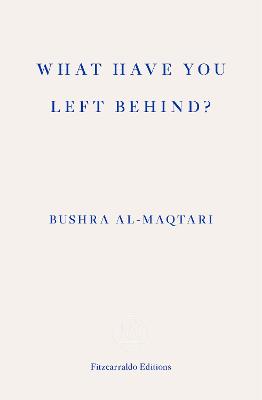
What Have You Left Behind?
Bushra al-Maqtari, Sawad Hussain
£12.99
Description
In 2015, a year after it started, Bushra al-Maqtari decided to document the suffering of civilians in the Yemeni Civil War, which has killed over 350,000 people according to the UN. Inspired by the work of Svetlana Alexievich, she spent two years visiting different parts of the country, putting her life at risk by speaking with her compatriots, and gathered over 400 testimonies, a selection of which appear in What Have You Left Behind? Purposefully alternating between accounts from the victims of the Houthi militia and those of the Saudi-led coalition, al-Maqtari highlights the disillusionment and anguish felt by those trapped in a war outside of their own making. As difficult to read as it is to put down, this unvarnished chronicle of the conflict serves as a vital reminder of the scale of the human tragedy behind the headlines, and offers a searing condemnation of the international community’s complicity in the war’s continuation.
Publisher Review
'This is an extraordinary collection of testimonies. It's almost unbearable to read, but averting your eyes from the suffering to which the book bears witness feels craven. Brave, painful, necessary and harrowing, Bushra al-Maqtari's work confronts the reader with the devastation of the war in Yemen and gives a voice to those whose lives have been destroyed by it.' - Marcel Theroux, author of Strange Bodies 'Bushra al-Maqtari's boundlessly humane project of collecting firsthand accounts to document the nearly decade-long Yemeni Civil War - and the West's complicity in it - is unblinking in its moral gaze. Every single voice collected in these pages is a blow to the heart. By the time I finished this book, I was consumed by sorrow and rage. This is an act of witnessing, and of making us engage in the witnessing of a disgraceful, criminal war that will shake your soul.' - Neel Mukherjee, author of A State of Freedom 'An oral history of war's folly in the tradition of Svetlana Alexievich, as devastating as Goya or Picasso. Al-Maqtari summons us to witness the innocent lives lost, and the love that survives in their wake.' - Matthieu Aikins, author of The Naked Don't Fear the Water 'Journalists covering war regularly claim their reporting gives "a voice to the voiceless ". What Have You Left Behind? demonstrates that survivors of Yemen's conflict are not voiceless, they are unheard. Bushra al-Maqtari brings a cacophony of voices from one of the world's most under-reported conflicts; voices that compel us to hear what war does to civilians living through it. What Have You Left Behind? is a disturbing, often evocative and emotional oral record of a war that most of us know little if anything about. This is not the sanitized, politicized version of the conflict debated in the power houses of far-off capitals. If you want to understand the true impact of war, brace yourself to hear these voices from Yemen.' - Iona Craig, winner of the Orwell Prize for Journalism 'Bushra al-Maqtari's book is like a cry from those buried beneath rubble, those the world has forgotten, nobody hears, and nobody helps.' - Ulf Kalkreuth, Das Erste 'When the fire of this war dies down, and the regional conflicting parties agree to a truce, and foreign entities are invited to rebuild the country, in those moments we will still have these heartrending stories, as a reminder of the sheer folly, empty grandeur and cold-blooded cruelty embodied by the war in Yemen.' - Qantara 'Bushra al-Maqtari writes against forgetting... Her reports get under our skin, horrify, move us to tears. Free of theatricality, the writing simple and compassionate, they make clear what war really means.' - Susanne El Khafif, Deutschland Radio 'Al-Maqtari's portraits are unsettling in their urgency, their need to make the world understand that the war in Yemen must not be forgotten... I would even dare to speak of a kind of dark poetry in al-Maqtari. Her language is nuanced and empathetic.' - Spiesser 'What sets this book apart is its narrative style, without being a novel, and its means of recording and documentation, without actually being a written record or document. ... What we read is painful, but our knowledge is enriched by the facts presented, as well as our literary experience with its language, marked by the pulse of life and death.' - Al Quds 'It is an attempt to put in words the way cluster bombs kill, and how it feels when your own children, siblings, or parents are torn apart by grenades, shredded by machine gun fire, crushed or buried beneath falling rubble.' - Florian Keisinger, Der Tagesspiegel
Book experts at your service
What are you looking for?